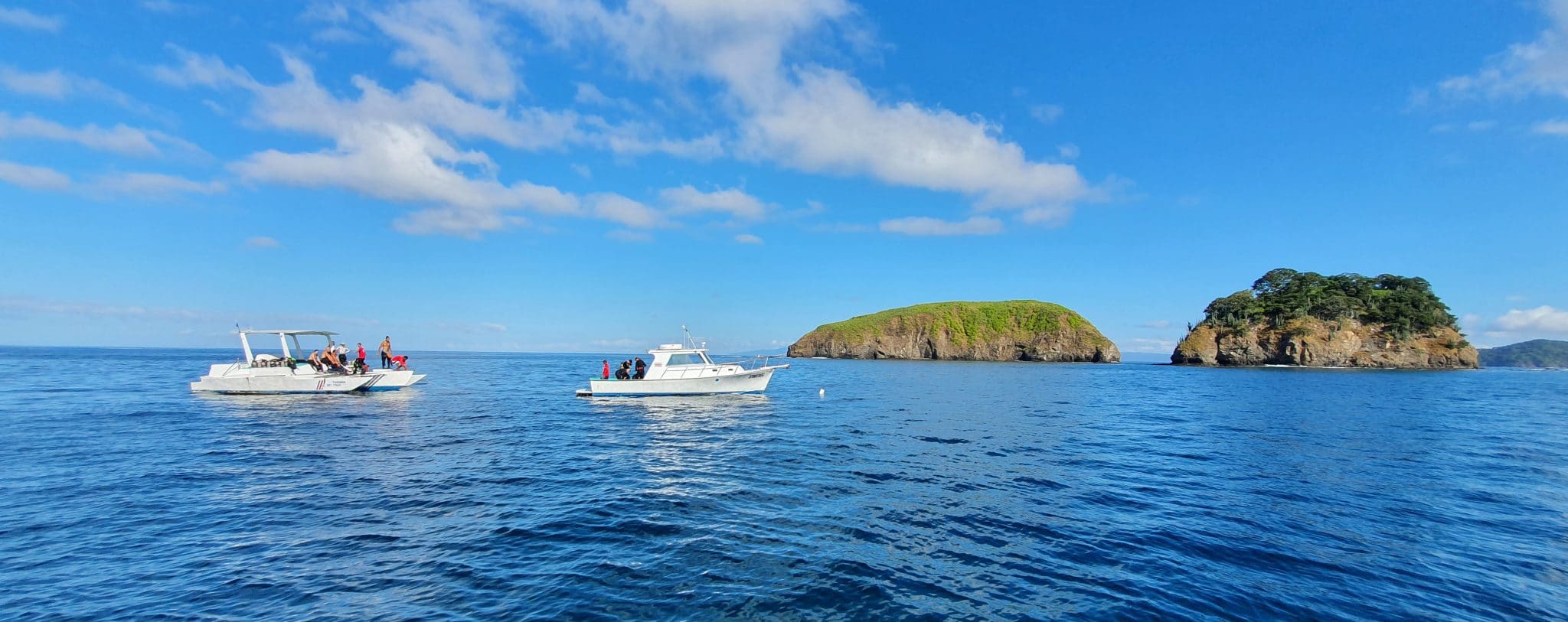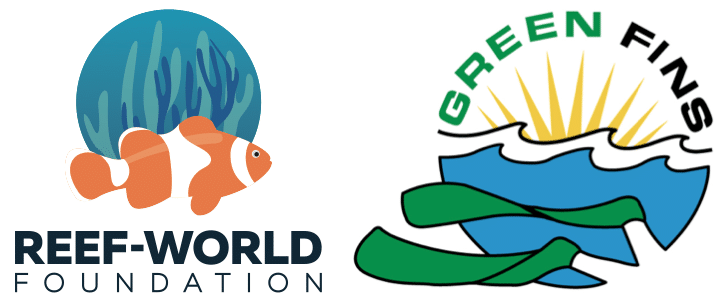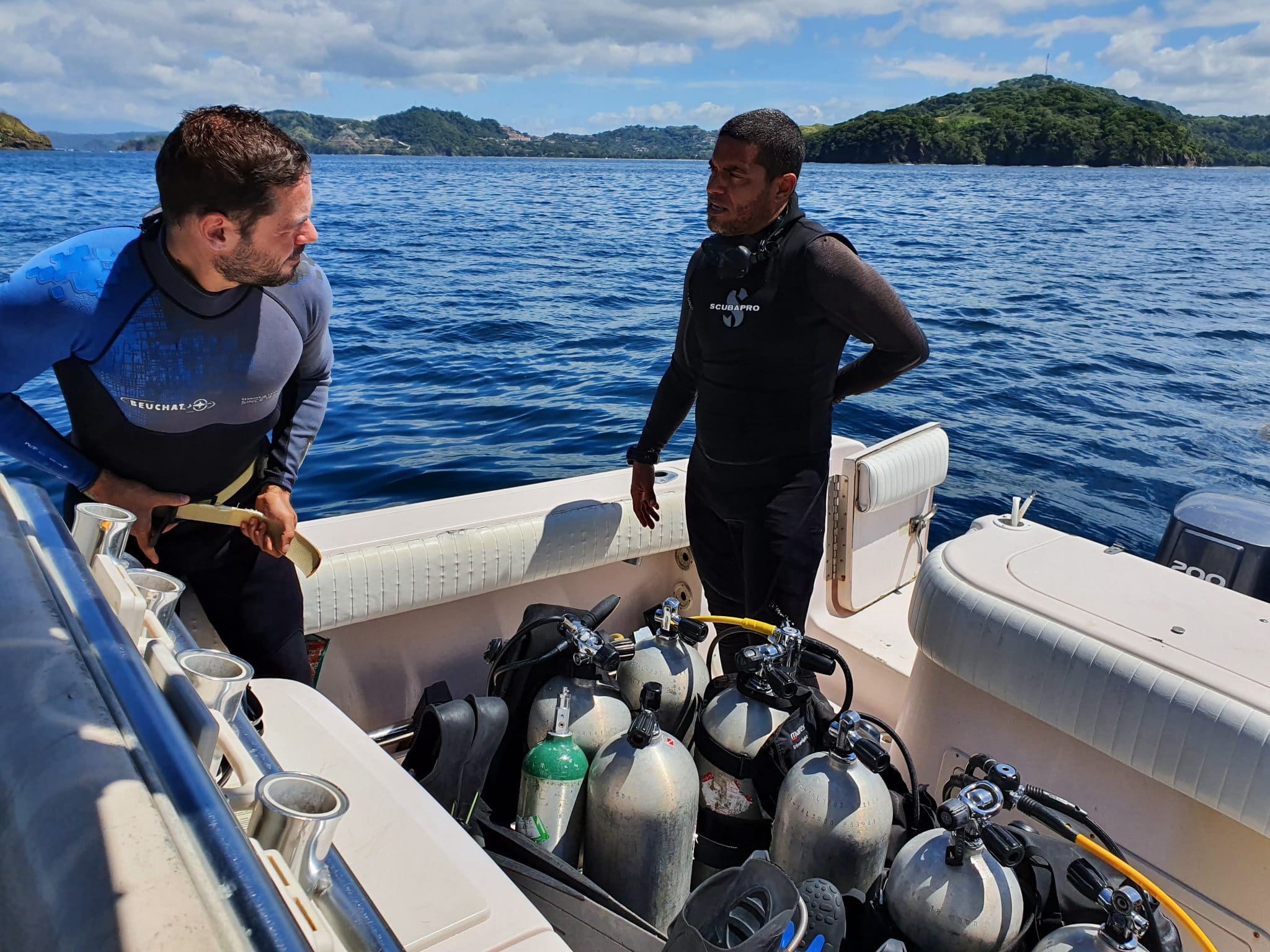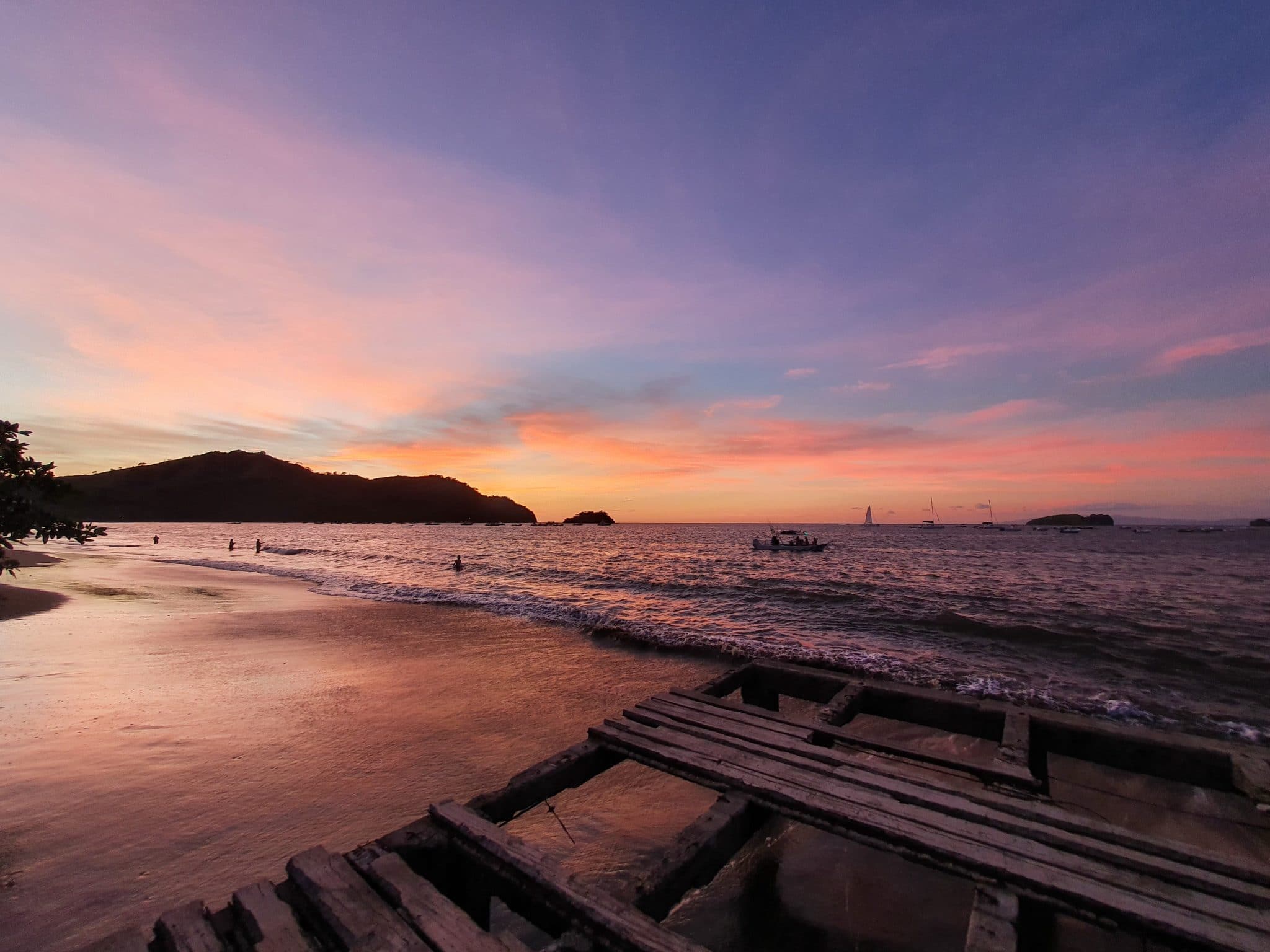Marine Life & Conservation
Reef-World launches Green Fins Costa Rica

 The Reef-World Foundation, the National System of Conservation Areas (SINAC) and Misión Tiburón are delighted to announce that Costa Rica has joined 13 other countries globally to implement the Green Fins initiative — a UN Environment Programme initiative. Costa Rica is the first country on the American continent to adopt Green Fins environmental standards to reduce the threats associated with diving and snorkelling on the marine environment.
The Reef-World Foundation, the National System of Conservation Areas (SINAC) and Misión Tiburón are delighted to announce that Costa Rica has joined 13 other countries globally to implement the Green Fins initiative — a UN Environment Programme initiative. Costa Rica is the first country on the American continent to adopt Green Fins environmental standards to reduce the threats associated with diving and snorkelling on the marine environment.
Green Fins is implemented in Costa Rica by Misión Tiburón through the National System of Conservation Areas (SINAC) with support from Cynthia Barzuna Gutiérrez, Vice Minister of Water and Seas. Green Fins is being piloted in Guanacaste province, the North Pacific of Costa Rica, a major hub for scuba diving and snorkelling, as the first step in a national process. In North Pacific Costa Rica itself, there are around 50 sites with ideal conditions for snorkelling and recreational diving. Scuba diving tourism is a source of employment for many families in communities such as Playas del Coco, Brasilito or Tamarindo. Ensuring the sustainable use of these dive and snorkel sites is essential so that they continue to be a source of employment for current and future generations.
Over the last 10 years, the tourism industry in Costa Rica has seen a steady increase. The implementation of Green Fins in Costa Rica responds to the national and international goals set to reduce threats to biodiversity. One of its goals is to increase the number of marine tourism companies with sustainability certifications to promote a sustainable diving and snorkelling industry in the country. The adoption of Green Fins in the country also contributes directly to the Sustainable Development Goals 12 and 14, established by the United Nations and adopted by Costa Rica.
Following a week of training by Reef-World (9 to 14 November 2021), Costa Rica now has a national Green Fins team comprised of four fully certified Green Fins Assessors from Misión Tiburón and one Green Fins Coordinator from the National System of Conservation Areas (SINAC). They will be responsible for recruiting, assessing, training and certifying dive and snorkel operators to become Green Fins members in the country. This involves providing training about the ecology and threats to coral reefs, simple and local everyday solutions to these threats and Green Fins’ environmental standards to dive and snorkel operators. Green Fins membership will help marine tourism operators improve their sustainability and prove they are following environmental best practices as a way of attracting eco-minded tourists.
James Harvey, Director at The Reef-World Foundation, said: “Marine tourism in Costa Rica is growing fast with high demand from both national and international tourists coming to visit the incredible marine species that the country has to offer. Implementing best practices and guidelines through the Green Fins approach with support from the government of Costa Rica is critical to ensure that this market is sustainably managed, protecting valuable marine ecosystems for years to come. The national team of SINAC and Misión Tiburón have set out ambitious yet realistic targets to achieve a high level of uptake of Green Fins amongst dive and snorkel operators across the country. This will reduce local threats to the marine environment and increase corals and other marine life’s resilience to wider global impacts, including climate change.”
Diving and snorkelling related damage to sensitive marine ecosystems, including coral reefs, is becoming an increasingly significant issue. This damage makes them less likely to survive other local and wider stressors, such as overfishing or plastic debris and the effects of climate change, such as rising sea temperatures. Based on robust individual assessments, the Green Fins initiative helps identify and mitigate these risks by providing environmental consultation and support to dive and snorkel operators. Through Green Fins implementation in Costa Rica, Reef-World aims to reduce negative environmental impacts in the region by reaching 14 marine tourism operators, training 70 dive guides and raising awareness of sustainability best practices among 14,000 tourists in the first year.
Ilena Zanella, Director of the Misión Tiburón, said: “The diving and snorkelling industry is an important ally to promote conservation practices on our marine and coastal ecosystems. Thanks to the industry’s natural involvement with these ecosystems, threats can be mitigated, and a more sustainable diving and snorkelling industry that follows Green Fins international standards can be established.”
Green Fins is a UN Environment Programme initiative, internationally coordinated by The Reef-World Foundation, which aims to protect and conserve coral reefs through environmentally friendly guidelines to promote a sustainable diving and snorkelling tourism industry. Green Fins provides the only internationally recognised environmental standards for the diving and snorkelling industry and has a robust assessment system to measure compliance. Reducing diving and snorkelling-related damage to sensitive marine ecosystems, including coral reefs, helps to make them more resilient to other stressors such as those associated with climate change.
The Green Fins approach includes proven assessment criteria to identify and mitigate high-risk practices above and below the water. Green Fins members are evaluated annually based on a 15-point code of conduct, which measures the company’s impact on coral reefs: of a possible score of 330, the lower the score, the lower its impact. The robust assessment then enables Green Fins Assessors to provide one-to-one consultation to help the business develop and implement best practice to improve the sustainability of the marine tourism industry.
The individual feedback from the assessments of the pioneering Green Fins members in Costa Rica and support provided includes practical, low-cost alternatives to common threats to the marine environment such as anchoring, provision of single-use plastics such as plastic bottles and lack of awareness of existing rules and regulations – is based on each company’s area of highest negative impact on the reef, as determined by the assessment.
To date, four Costa Rican dive operators have already joined the global network of 600+ trained and assessed Green Fins members. These are: Deep Blue Diving, Kraken Divers, El Refugio Guanacaste and Rich Coast Diving. There has also been significant interest from other operators who have signed the membership form and are looking forward to their training and assessment.
Mauricio Méndez, Technical Director of National System of Conservation Areas (SINAC), said: “Green Fins serve as an important tool for local diving communities to move towards a more sustainable use of their dive sites; so that they can maintain their scenic beauty and biological richness to provide livelihoods for many generations to come.”
The launch of Green Fins Costa Rica was made possible thanks to financing support from IDB Lab under the Beyond Tourism Challenge. The Beyond Tourism Innovation Challenge was run by the Inter-American Development Bank (IDB) through its innovation laboratory, IDB Lab, and in collaboration with the United Nations World Tourism Organization (UNWTO).
For more information, please visit www.reef-world.org, www.greenfins.net/countries/
Costa Rican dive and snorkel operators interested in signing up to be Green Fins members can contact the Green Fins Team at Misión Tiburón (costarica@greenfins.net).
Marine Life & Conservation
Paul Watson Released as Denmark Blocks Japan’s Extradition Bid

Renowned anti-whaling activist Paul Watson has been released from custody in Greenland after spending five months in detention. Denmark’s Justice Ministry rejected Japan’s request for his extradition, citing insufficient guarantees that his time already served in custody would be credited against any potential sentence.
The 74-year-old Canadian-American was arrested on July 21 in Nuuk, Greenland’s capital, when his ship docked to refuel. His arrest was based on a 2012 Japanese warrant related to a 2010 encounter in Antarctic waters. Japan alleged Watson obstructed operations and caused damage to a whaling research ship during efforts to disrupt illegal whaling. Watson has consistently denied these claims, maintaining his commitment to marine conservation.
Denmark, which oversees extradition matters for Greenland, concluded that while the legal conditions for extradition were met, the lack of assurances from Japan regarding time-served credit made extradition untenable.
In a video shared by his foundation, Watson expressed gratitude and relief, saying, “After five months, it’s good to be out… and good to know they’re not sending me to Japan.” He added that the most difficult part of his time in custody was being separated from his two young sons.
Watson is a pioneering figure in marine conservation, known for founding the Captain Paul Watson Foundation in 2022 after decades of activism with the Sea Shepherd Conservation Society. His bold efforts to defend marine life have earned him widespread support, including from celebrities and conservationists. His work has also been featured in the acclaimed reality TV series Whale Wars.
Watson’s lawyer, Jonas Christoffersen, praised the decision, stating, “We are happy and relieved that Paul Watson is now free.” He added that Watson is eager to reunite with his family and continue his vital work.
The arrest occurred while Watson’s vessel, the M/Y John Paul DeJoria, was en route to the North Pacific with a team of 26 volunteers to intercept a Japanese whaling ship. His foundation described the arrest as politically motivated and emphasized that Watson’s actions were focused on ending illegal whaling practices.
Japan resumed commercial whaling in 2019 after leaving the International Whaling Commission, asserting that whale meat is a cultural tradition. Conservationists, however, continue to challenge these practices, highlighting their impact on marine ecosystems.
Despite the challenges, Watson remains steadfast in his mission to protect marine life and bring attention to whaling practices. His dedication to ocean conservation has made him a globally respected advocate for the environment.
Marine Life & Conservation
12 Days of Zero-Waste Fish-mas

This holiday period, the Marine Conservation Society, the UK’s leading ocean membership charity, invites you to make some simple changes to eating fish this Christmas to help our seas.
Dr Kenneth Bodles, Head of Fisheries and Aquaculture at the Marine Conservation Society, said, “During the festive season, our consumption increases, but so does waste. Sustainability isn’t just about where food comes from – it’s also about how you use it. By reducing waste and making the most out of your seafood, you’re not only taking steps to be more ocean-friendly, but can also help to cut costs during what is often one of the most expensive times of the year”.
The Marine Conservation Society has compiled twelve tips on how to consume seafood sustainably with zero-waste this Christmas:
Buy whole fish instead of fillets
Instead of fillets, consider buying whole fish such as salmon, hake, or lemon sole. By adopting a “nose to tail” approach with cooking, whole-baked fish not only feeds a crowd, but also helps to minimise waste and maximise sustainability by using up every part of the animal, including bones, skin, and fat.
Make fish stock
Leftover fish bones or shells can be put to good use by boiling them to make a nourishing fish stock or bisque. This can be frozen and preserved for later use and makes for a flavourful base in a soup.
Make your own fish pâté
Avoid waste by turning leftover fish, such as smoked mackerel or salmon, into a delicious pâté by blending with cream cheese and lemon. Perfect when paired with crackers.
The sustainability of salmon and mackerel varies depending on where and how it is caught or farmed. For more information on green-rated options, check the charity’s Good Fish Guide.
Buy frozen
By purchasing seafood that is frozen or vacuum-packed, this helps to reduce waste by extending the shelf life of your food.
Fish pie
If you’re wondering what to do with leftover cooked fish, why not opt for a classic fish pie with mashed potatoes, leeks, and a cheesy sauce? A sure crowd pleaser on Boxing Day.
Use the head
Don’t forget the fish head! The meat is incredibly tender and flavourful. The charity recommends a cod’s head curry or recreating Fallow’s renowned cod’s head in siracha butter.
By stretching your ingredients further, not only is this a more sustainable way to enjoy seafood, but also cost-effective by repurposing leftovers and cooking creatively.
Boxing Day brunch
Mix leftover kippers or smoked salmon with scrambled eggs for a tasty, zero-waste, Boxing Day brunch.
For best choice, make sure you buy kippers, or herring, from the North Sea and the North Irish Sea.
Zero-waste storage
A top tip from the Marine Conservation Society to avoid waste is freezing fish offcuts to save for future use.
Crisp up the skin
Even leftover fish skin can be turned into a quick savoury snack by crisping it up in an air fryer with a little olive oil and salt.
Anchovies two ways
Leftover anchovies can either be blended with butter to make a delicious anchovy butter or tossed into pasta for a hit of umami flavour.
The charity recommends opting for anchovies caught in the Bay of Biscay for best choice.
Fishcakes
For an easy, zero-waste meal, leftover seafood trimmings can be mixed with mash and fried in breadcrumbs to make fishcakes.
Pickled mussels
Try pickling mussels in 1:1 vinegar and water, with a dash of sugar for a sustainable, zero-waste snack that can be enjoyed well beyond the festive season.
Mussels farmed in the UK are a seafood superhero. Grown using low-impact methods and harvested by hand, they get all the food they need from the sea around them. This makes them one of the most sustainable, ocean-friendly, and cost-effective seafood options.
Players of People’s Postcode Lottery have raised £6.6M towards the Marine Conservation Society’s vital work in making seafood more sustainable.
Laura Chow, Head of Charities at People’s Postcode Lottery, said: “Fish is a festive favourite for many, but making sustainable choices when it comes to how we buy and eat seafood makes all the difference for our ocean. Support from players of People’s Postcode Lottery has helped the Marine Conservation Society further its sustainable seafood work, so that we can all enjoy healthier, better protected seas.”
The Marine Conservation Society encourages you to make sustainable seafood choices a year-round habit, not just for Christmas. To check how sustainable the seafood on your plate is, you can visit the charity’s Good Fish Guide. The Guide helps consumers and businesses identify the most sustainable seafood using a simple traffic light system, based on where and how species are caught or farmed. Green is the best choice, amber means improvements are needed, and red indicates fish to avoid buying.
Zero-waste gift idea
Why not embrace a zero-waste Christmas by gifting a membership to support marine conservation? It’s a meaningful, low-waste gift that helps protect our ocean for generations to come. Memberships start from as little as £5 a month – the price of a sandwich and drink from your local coffee shop.
Find the latest sustainable seafood advice for wild-caught and farmed seafood on the Good Fish Guide, downloadable to your phone from www.mcsuk.org/goodfishguide.
-

 News2 months ago
News2 months agoIconic SS United States to become the World’s Largest Artificial Reef
-

 News3 months ago
News3 months agoBook Review – 52 Assignments: Underwater Photography
-

 Gear News3 months ago
Gear News3 months agoDYNAMICNORD – New German diving brand enters the British market
-

 News3 months ago
News3 months agoExploring Cenote El Pit: A Diver’s Dream
-

 Gear News3 months ago
Gear News3 months agoTry BARE drysuits (and maybe even win one!) this Friday with Sea & Sea at North West Dive Fest
-

 Marine Life & Conservation3 months ago
Marine Life & Conservation3 months agoBook Review: Coral Triangle Cameos
-

 Blogs2 months ago
Blogs2 months agoDive the Egyptian Red Sea this Autumn with Regaldive
-

 News3 months ago
News3 months ago2024 Ocean Art Underwater Photo Competition Announced

















